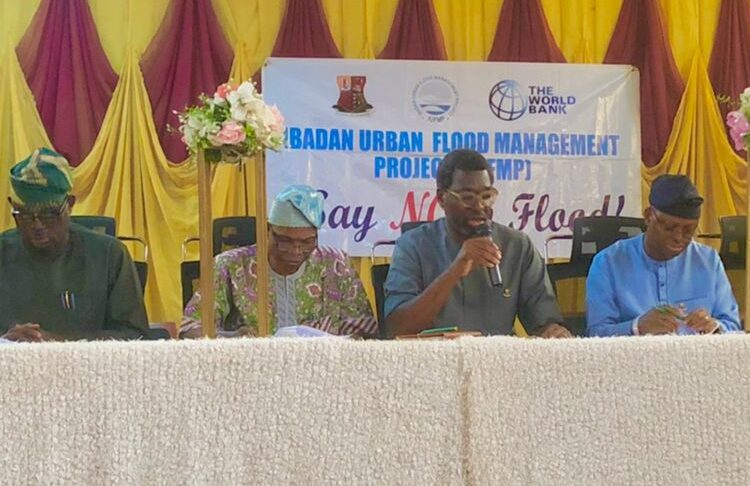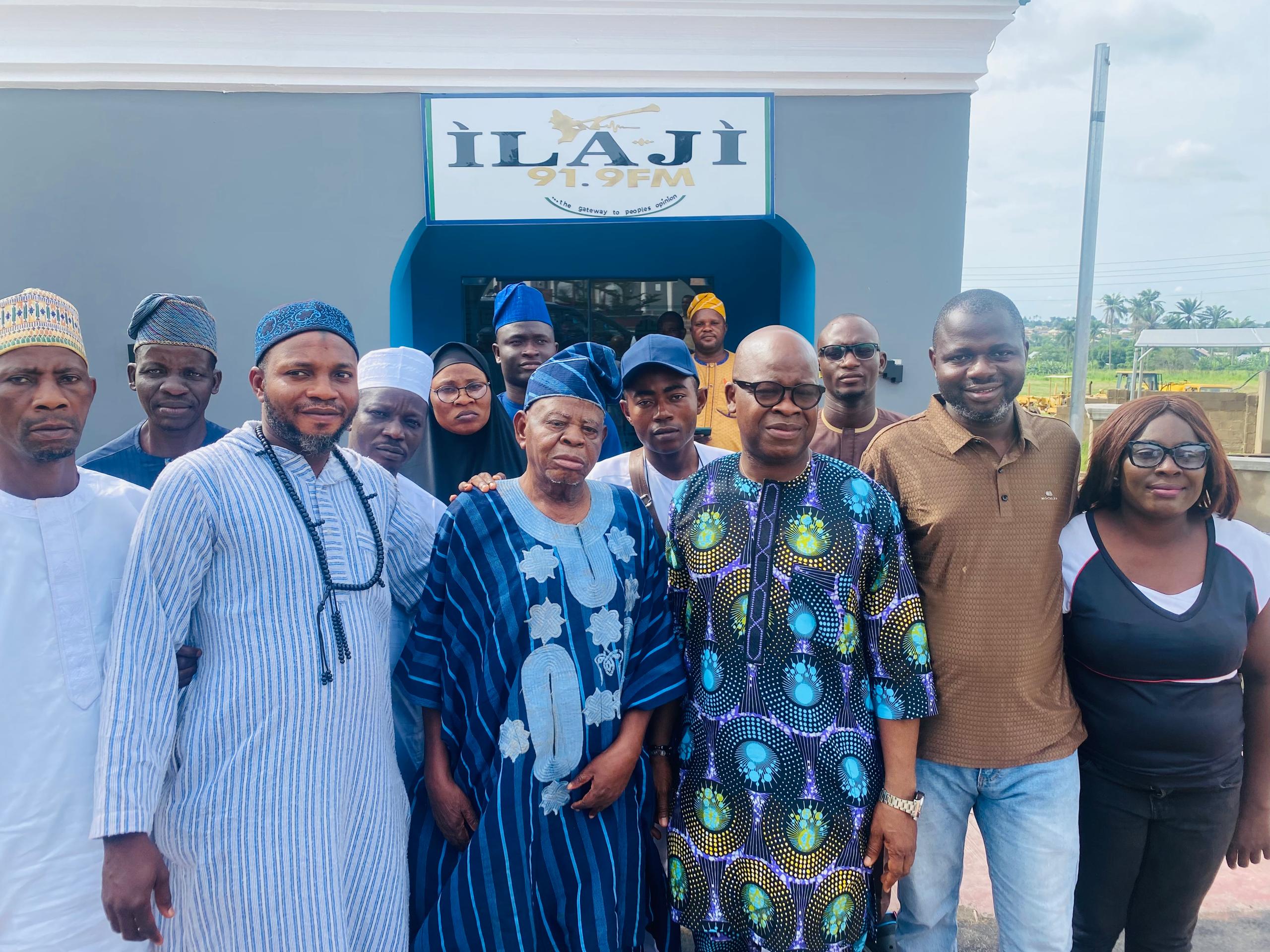As part of efforts proactive measures taken to forestall annual flooding in Ibadan the Ibadan Urban Flood Management Project (IUFMP) says it projects delivered several massive hydraulic structures designed and constructed to boost the flood resilience index of the city.

Some of the projects include bridges and culverts at Abonde-Ogbere, Alaro Poly, Alaro 7-Up, Believer’s Stream (Odo Ona Elewe), Cele Rainbow, Ebenezeri, Elere Community, Foworogi, Isokun-Ojoo, Maje, Ogbere-Moradeyo, Oki Oke-Ayo, Ola-Adua, Olorungunwa, Omirin, Ogbere-Pegba, Sasa-Osajin, and lately some tens of culverts and bridges across the Agodi, Orogun, and Kudeti rivers, which are at different levels of completion. Also, the now 80-year-old Eleyele Dam, which was badly hit by the Year 2011 flood event in Ibadan, has been totally rehabilitated.
The achievements was disclosed on Thursday during the press conference addressed by the Oyo State Honorable Commissioner For Finance, Hon. Akinola at Ibadan, the Oyo State Capital.
The Commissioner said that the significant of the briefing derives largely from the relatively pleasant experience of the city of Ibadan and most parts of the Oyo State in the recently ended year 2022 rainy season, vis-à-vis the pervasive unsavory flooding encounters in well over twenty-seven (27) States of Nigeria, including parts of the Federal Capital Territory, Abuja.
In his words,
“As members of the Fourth Estate of the Realm, you are well aware of the much- publicized flooding saga that befell Nigeria in the outgoing year, with grave statistics following. As culled from an online resource (ECHO, 18 Oct 2022):
“Media report (quoting national authorities), as of 18 October, 603 fatalities, over 2,400 injured, nearly 1,303,000 displaced people and a total of more than 2,504,000 affected people across the country. In particular, the Bayelsa State is the worst affected, with around 700,000 either displaced or affected people. In addition, same sources also report around 203,400 damaged houses, of which over 82,000 fully damaged or destroyed”
“The casualties and losses presented in the above report did not come to the nation by happenstance. Rather, predictions and projections issued much earlier in the year through the Annual Flood Outlook (AFO) and Seasonal Rainfall Predictions (SRP) by the Nigeria Hydrological Services Agency (NIHSA) and the Nigerian Meteorological Agency (NiMet) respectively had cautioned on them. The two documents catalogued States, LGAS and Cities with varying degrees of flooding probabilities. Worthy of note was that our dear Oyo State was listed, with Ibadan fingered as probable to flash floods.”
“No sooner had the rains come in torrents when news started breaking of deluge, wreckages, inundations, sweep-offs, cut-offs and other colossal losses. Memories of the Year 2012 flooding surge came back to mind, as some States and Cities were either totally or partly severed from the rest of the country. As traumatic as the encounters were, so controversial was the narrative around the cause(s). While some sources attributed the overwhelming flooding to the release of water from one Lagdo Dam in the Republic of Cameroon, Federal authorities claimed it was triggered by intense rainfall and climate change. It was a most devastating period of confusion and quandary for a nation already beleaguered by its peculiar existential challenges of security breaches and other social vices.”
“Against the backdrop of such a national upheaval, it was therefore most gratifying that Ibadan and indeed most parts of Oyo State were largely spared being parts of the frightening environmental disaster across the land”
The Commissioner also said that the vulnerability of Ibadan, particularly, to river and urban flooding is induced by the city’s topographic terrain, the problem of indiscriminate waste disposal, building of houses on flood plains, with the tendency of all the foregoing even being aggravated by the ravaging effects of the climate change.
He said further
“It was in realization of this that the Engr. Seyi Makinde administration right from inception bought wholly into the full implementation of the Ibadan Urban Flood Management Project, the state-owned flood risk mitigation project with funding and technical assistance from the World Bank. “
“On a much larger scale, the channelization of major rivers and water channels in Ibadan under the IUFMP scheme is ongoing as evident in some portions of the Agodi, Orogun and Ogbere Rivers. Contractors have been mobilized for Ona and Kudeti Rivers too, alongside the trios mentioned above. When completed, these massive channels, which are in the mould of the popular Ogunpa Channel, would boost the flood-water runoff draining capacity of the city.”
“It is instructive to state that the above-listed interventions and many others are in consonance with modern-day flood risk management techniques and are well in excess of the modest recommendations by the federal regulatory agencies on flooding and water resources. It is therefore safe to conclude that these interventions being methodically implemented under IUFMP have contributed extensively to the city’s relatively flood-free status in the outgoing year. In other words, the conscientious implementation of IUFMP has helped Oyo State to prove the weatherman’s predictions wrong, despite the devastating deluge that happened both far and near in other parts of the country.”
“In preempting the antics of fifth columnists who are notorious for quoting statements like the submissions above out of context, let me add that nobody is saying that there were no incidents of floods at all in Oyo State during the last rainy season. As a matter of fact, we were aware of some inundation in certain areas of Moniya in Akinyele LGA; with top government functionaries visiting the communities to assess the impact. But the reality was that, aside the temporary disruption to human/vehicular movement before the water receded, there were no loss of lives and property. Also, the Oyo State Government is not, by this media debriefing, making mockery of other States or Cities that were hit by the 2022 flooding, Far from it! It is just to enable all stakeholders put the project outcomes in proper perspectives”.
However, the Commissioner also assure the people that the project is not done and that they would not rest on their oars.
He said,
“All the anthropological or man-made causes of flooding in our locality are still causes for concern. Improper waste disposal, poor land use pattern, building on waterways, etc. remain predisposing factors for urban flooding. Yes, we are in the dry season now; but let us remember that indulging in any of the above infractions this season will impact adversely on us as soon as the rains return in 2023.”
“Our Governor, His Excellency Engr. Seyi Makinde, has continued to place a huge premium on environmental cleanliness and rectitude as a way of life. Let us all fully buy into His Excellency’s vision of a clean, smart, safe and resilient environment. It is a duty we owe to the Earth, which is the only natural habitat available to us. Let’s not fail God; let’s not fail ourselves.”
“As a responsible government, we care about the safety of the lives and property of our citizens and would not want them to suffer any avoidable losses. We, therefore, count on you, Gentlemen of the Press, to amplify these Project gains as well as the precautionary measures going forward. As critical stakeholders and our co-partners for development, all media houses represented are even enjoined to make dissemination of such messages part of its daily routine, as your modest contributions to making our State and City flood-free. The situation at hand demands our proactive response and collaborative effort. “
Present at the briefing includes, the Oyo State Commissioner For Works, Prof. Daud Sangodoyin, Commissioner For Lands, Hon. Olayiwola Olusegun Emmanuel, the Permanent Secretary Ministry Of Environment, Modupe Adeleye.

















